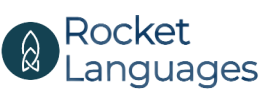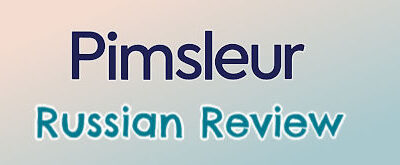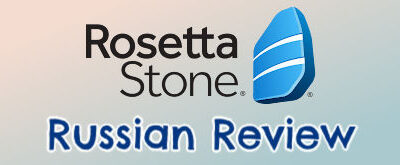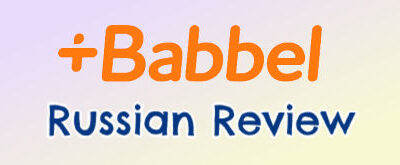Rocket Languages offers a comprehensive Japanese language program designed to cater to learners of all levels, from beginners to advanced speakers. This program combines interactive audio lessons, language and culture lessons, and practical reinforcement exercises to ensure a well-rounded learning experience. In this review, we’ll explore the features, benefits, and potential drawbacks of Rocket Languages’ approach to mastering Japanese.
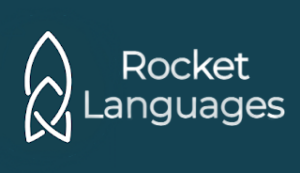
Rocket Languages
- Free Trial
- Money Back Guarantee
Pros
- Affordable lifetime plan (less than $180 after discount)
- Helpful audio lessons that feature fluent Japanese speakers
- Robust verbal practice drills
- Impressive speech recognition technology
- In-depth grammar lessons and cultural insights
Cons
- Not the best fit for visual learners
- Limited community interaction and gamification
How The Rocket Japanese Program Is Organized
The Rocket Japanese program is organized into three main levels: Beginner (Level 1), Intermediate (Level 2), and Advanced (Level 3).
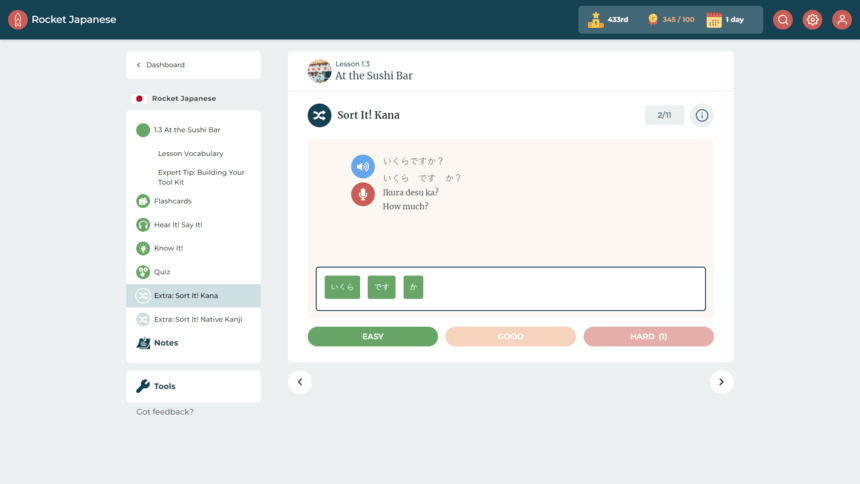
Each level is further divided into 8 or 9 learning modules, with each module containing approximately 15 to 20 lessons. Unlike other Japanese language apps like Rosetta Stone and Busuu, which typically offer a single type of lesson, Rocket Japanese provides three distinct lesson types: “interactive audio lessons” (usually 4 or 5 per module), “language and culture lessons” (also around 4 or 5 per module), and “writing lessons,” which focus on developing skills in Kana and Kanji, with about 8 lessons per module dedicated to this area.
How Much Does Rocket Japanese Cost?
The key distinction with Rocket Languages is that they offer lifetime access plans instead of the common monthly subscription model found with other apps like Duolingo and Rosetta Stone, which typically cost between $5 to $15 per month.
While Rocket Japanese may seem more costly at first glance, with lifetime plans priced around $150 for the Beginner level, $300 for the Intermediate bundle (Levels 1 and 2), and $450 for the Advanced bundle (Levels 1, 2, and 3), there are often significant discounts available.
It’s worth noting that Rocket Languages frequently offers promotions, often reducing the price by 40% to 60%, so checking for deals or coupons before purchasing is advisable. They also provide a free trial, allowing potential users to try out the program before committing to a purchase.
Pros Explained
Now that you have a good idea of what Rocket Japanese costs, and how their language program is structured, let’s discuss the strengths and weaknesses of their Japanese course.
Helpful Audio Lessons
The standout feature of Rocket’s Japanese language program is its interactive audio lessons. Unlike many other language apps that offer short, basic lessons with little focus on spoken practice, Rocket provides an immersive experience that encourages active participation.
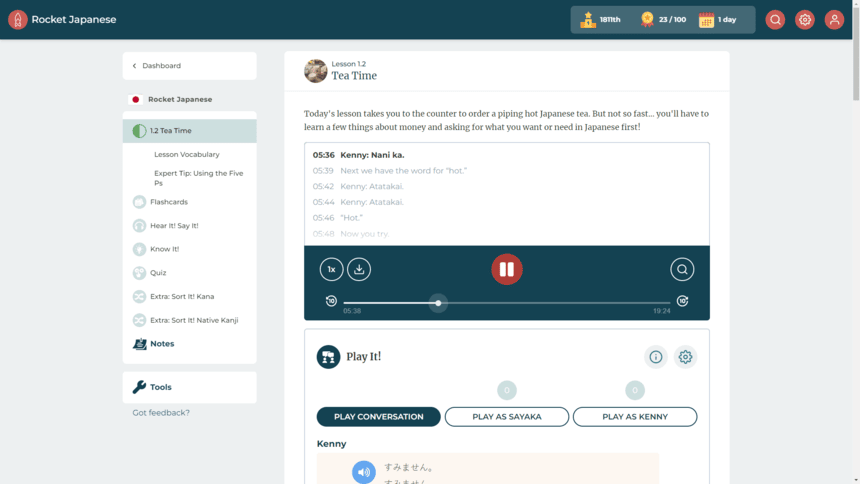
The audio lessons guide learners through conversations, with a moderator explaining the content in detail, offering vocabulary and pronunciation tips, and prompting learners to practice speaking aloud. This approach requires active listening, critical thinking, and quick responses, simulating real-life conversation scenarios.
This type of contextual learning is particularly effective for those learning Japanese because it mimics the natural language acquisition process. Engaging directly with the language in realistic settings helps learners develop a deeper understanding and improves their ability to use the language in practical, everyday situations.
Detailed Practice Drills
Another standout feature of Rocket’s Japanese program is how it reinforces its audio lessons with follow-up drills. After completing a 20-minute audio session, it’s common to feel overwhelmed with all the new information. The reinforcement drills are designed to help organize and cement this new knowledge.
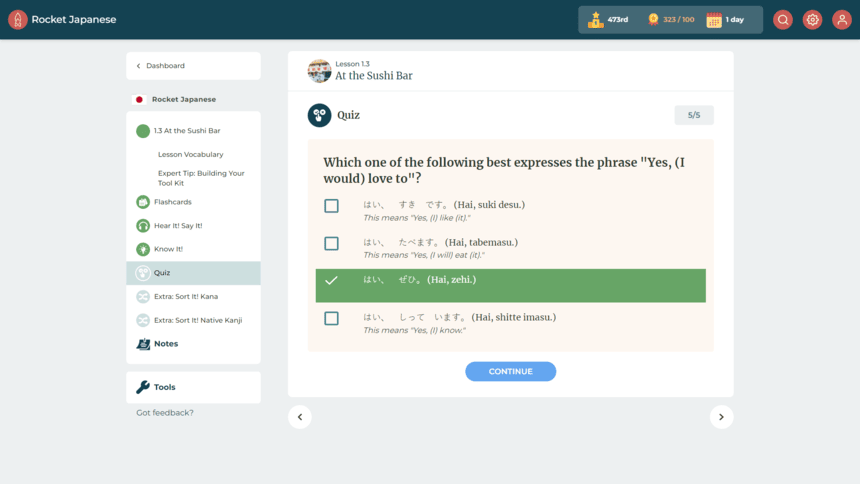
Additionally, you can replay the dialogue from the audio lesson and take on the role of one of the native speakers, which further enhances retention. For many learners, having these drills immediately after the audio lessons is incredibly effective in solidifying what was just learned, making the material more memorable and easier to recall.
Accurate Speech Software
Another major advantage of Rocket’s program is its speech recognition technology, which is essential for learning Japanese. Japanese pronunciation can be challenging for English speakers due to the significant differences between the two languages.
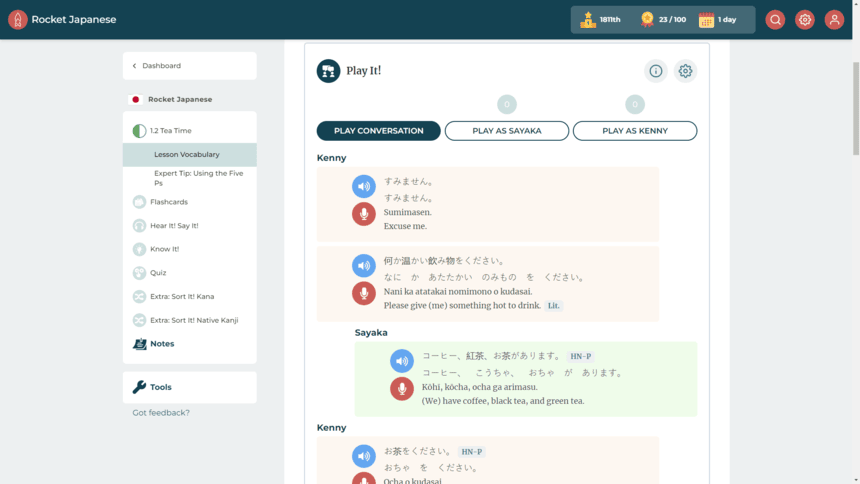
Having reliable speech recognition can greatly improve pronunciation skills, and Rocket utilizes Google’s Web Speech API, which is widely regarded as one of the top speech recognition tools available. This technology helps learners refine their pronunciation more effectively. Note: Rosetta Stone has fantastic speech software as well if this is important to you.
Insightful Grammar Instruction
The last strong point of Rocket’s program is its focus on grammar instruction. Unlike English, Japanese grammar is quite different, making it essential to emphasize it for anyone aiming to achieve fluency. Unlike apps like Duolingo and Pimsleur, which only briefly touch on grammar within their main lessons, Rocket takes a more comprehensive approach.
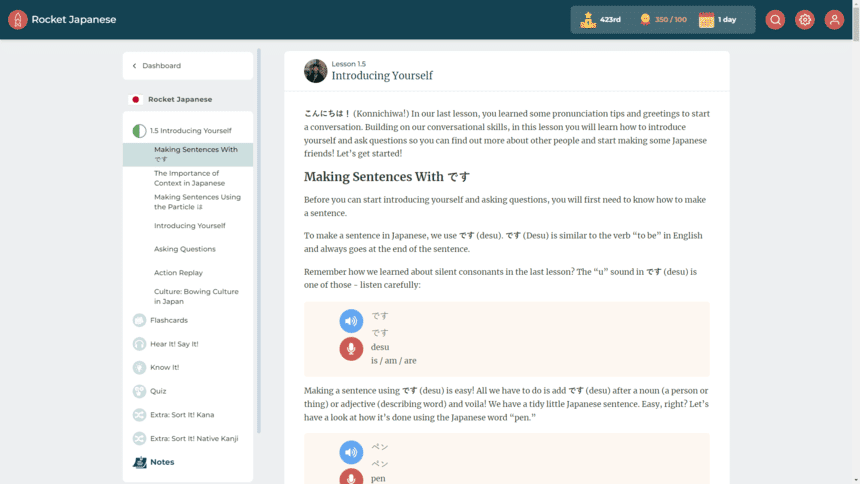
Firstly, during Rocket’s audio lessons, the moderator frequently pauses to explain key grammar concepts. Additionally, most of the detailed grammar instruction is provided through the program’s language and culture lessons, which offer in-depth explanations.
While Rocket’s grammar lessons might not be as entertaining or straightforward as those in some other apps, they are far more thorough and effective in helping learners truly understand the language.
Cons Explained
Now that we’ve covered the positive aspects of the Rocket Japanese course, it’s only fair we discuss the negative aspects as well.
Lack Of Visual Elements
One downside of Rocket Japanese is that it may not be ideal for visual learners, as its lessons primarily rely on audio and text rather than visual content. This is true for both the audio and language lessons, which have minimal imagery and video.
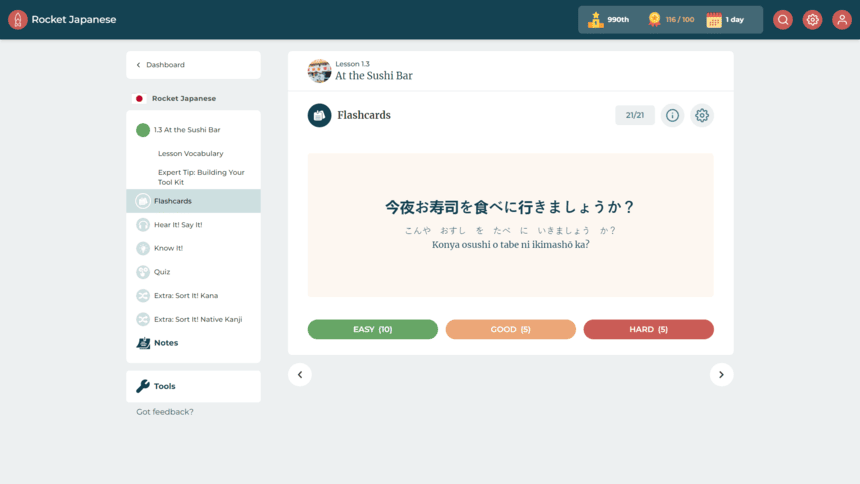
While Rocket’s writing lessons do include short videos and diagrams, making them suitable for visual learners, the main lesson types do not emphasize visuals. In contrast, programs like Rosetta Stone and Lingopie use a lot of imagery to enhance learning. Therefore, if you are a visual learner who relies heavily on graphics to understand and retain material, Rocket Japanese might not be the best fit.
Lessons Require Time
Rocket’s audio lessons are highly effective but quite long. Unlike shorter lessons found in apps like Duolingo, completing a full Rocket lesson, including the audio and reinforcement drills, can take up to an hour.
While it’s possible to pause and resume lessons later, those with busy or unpredictable schedules might find it challenging to finish a lesson in one sitting. Therefore, if you prefer shorter study sessions, Rocket Japanese might not be the best choice.
No Gamification
One drawback of the Rocket Japanese program is that it lacks a strong sense of community compared to other Japanese language apps. Although Rocket offers a leaderboard to see how you rank among other users and a forum for discussing language-related topics, these features don’t foster much interaction.
In contrast, apps like Busuu connect learners by having them provide feedback on each other’s speaking exercises, and Duolingo uses gamification to create a more interactive and engaging community feel. If connecting with other learners is important to you, Rocket may not be the best option.
In our opinion, gamification can be highly beneficial for language learners by making the learning process more engaging and fun. Elements like points, levels, and rewards can motivate learners to practice regularly and stay committed to their goals.
Verdict: Is Rocket Languages Good For Learning Japanese?
Based on our team’s experience with Rocket Japanese, the answer is a definite yes. Learning Japanese is challenging, especially if you want to go beyond just picking up a few phrases and aim to hold basic conversations. For those serious about reaching an intermediate to advanced level of fluency, Rocket stands out as more effective than the other apps mentioned throughout this review.
However, if your goal is to learn a few basic phrases with quick 10-minute lessons, especially for an upcoming business trip to Tokyo, other apps might be more suitable. But if you’re committed to achieving a deeper understanding and fluency in Japanese, Rocket is an excellent choice.
While the lessons can be long and demanding, overall, Rocket is one of the most comprehensive and effective Japanese language learning programs our team has reviewed.
👉 Read Next: Best Apps To Learn Japanese
After using and testing Rocket Japanese, our team found it to be a very strong program. While it may not be as engaging or entertaining as Duolingo and similar apps, it offers a much more in-depth and thorough approach, which we believe makes it more effective overall.
Rocket Japanese is available in three levels: beginner, intermediate, and advanced. The cost for all three levels bundled together is approximately $450, but there are often sales where you can find it discounted down below $200.

